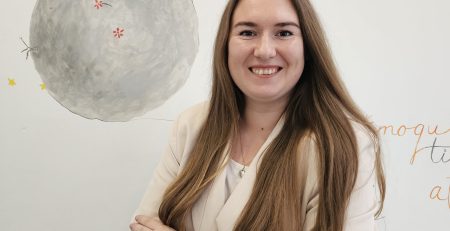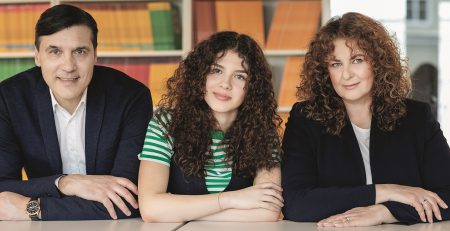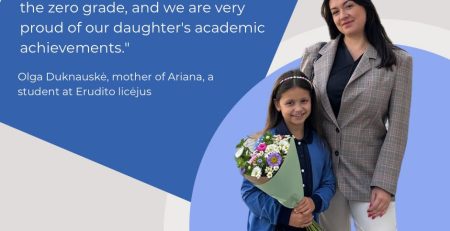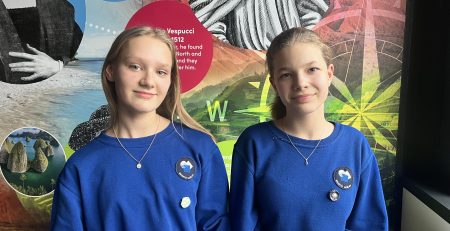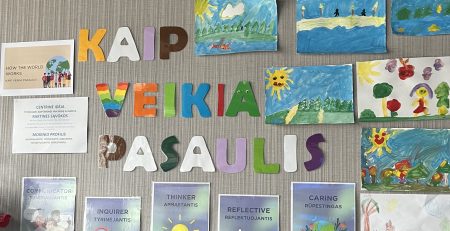
The visit of Latvian Writer Nora Ikstena at Erudito: “The Most Important Thing for a Writer Is to Be Yourself”
Erudito2024-04-08T16:19:40+03:00On March 25th, on the European Day of Writers, Latvian writer Nora Ikstena visited the Erudito Licėjus at the invitation of the European Writers’ Council, the Lithuanian Writers’ Union, and the Latvian Writers’ Union. She met and interacted with students from grades 10-12.
The European Authors’ Day, now in its second year, is an initiative of the European Commission aimed at bringing closer together the sectors of books and education. The initiative seeks to encourage more reading among youth and to discover European fiction literature, its languages, and cultural diversity. Therefore, the European Commission and the European Writers’ Council organize an author tour – to have as many writers as possible push boundaries, transcend borders of countries, languages, and cultures, meet with youth audiences from different countries, share their work with them, and become more accessible, understandable, and open to youth. It is believed that live meetings will allow young readers to explore and discover the rich literature of Europe.
We were very fortunate that Latvian writer Nora Ikstena, whose novel “Mother’s Milk”, translated into Lithuanian in 2019, became an undisputed bestseller and one of the main highlights at book fairs in London, Vilnius, and elsewhere that year, visited the Erudito Licėjus. This author’s most famous novel has already been translated into 40 languages and is the first book translated into the language of the Faroe Islands. “Mother’s Milk” is being read in Mexico, Indonesia, Egypt, Japan, and elsewhere. Soon, we should be able to access Nora Ikstena’s latest novel “Jona,” translated into Lithuanian, which the author talked about during the meeting with students.
“I have traveled a lot and have seen various international communities and audiences, and the most common question I receive is about what writers do. Writers not only write,” Nora Ikstena organically began the meeting. “They do various things, travel a lot, and so on. However, now I travel very rarely because I feel very good at home by the river.
When I finished university studies, I went and lived in New York for a year and a half. I traveled to America several times and already as a writer, I have works there. But I returned to Latvia because I am a Latvian writer and I write in Latvian. I have written probably 35 books, most of which received the most attention was my novel “Mother’s Milk” written in 2015, which caused a real snowball effect. I couldn’t even imagine that my book would be translated and published in Thailand or the Faroe Islands. Or in Japan.
My latest book is “Jona,” which should soon be released in Lithuanian as well. It’s a story about the friendship between a human food transporter and a blue whale. It’s not a fairy tale, but a very realistic story that helps to better understand people and how we feel in the world. This book once again proves that the greatest value and meaning of life is love – not only for humans but also for nature, for God.”
With such a brief and intriguing introduction, the meeting with the students of Erudito Licėjus began.
Q: Which authors have inspired or inspire you? Which writers do you read?
A: That’s a very good question. Perhaps it’s a coincidence, but I studied Anglo-Saxon literature, and my teacher spent fifteen years translating James Joyce’s “Ulysses” into Latvian. Since I couldn’t travel, crossing oceans, he would send me books, which are now considered classics. Among those books, of course, is “Ulysses,” but I would highly recommend James Joyce’s “Dubliners,” which is an amazing book and is readable!
I also like my colleague, Latvian writer Inga Ābele, whose works have also been translated into Lithuanian. I think we both inspire each other (laughs), we are also close friends. Jurga Ivanauskaitė’s scandalous novel “The Witch and the Rain” left a huge impression on me. Jurga and I were close friends: we met either in Berlin or London, but never in Vilnius, Lithuania. And here I am today with you and found out that across the street, you have a monument to Jurga – the famous “Cat”! It’s a wonderful coincidence. Among Lithuanian writers, I also really like Ričardas Gavelis, I recommend reading his “Vilnius Poker,” Jurgis Kunčinas, Sigitas Geda, Marius Ivaškevičius’ plays (but I don’t like him as a prose writer, I think he does better at writing plays) – I saw his “Eviction,” I think it’s a great work, it was very popular in Latvia. And one of my favorite books is Antanas Škėma’s “White Shroud.” I think he’s brilliant. I like Scandinavians and writer Karen Blixen and many other writers and their books!
Since I studied philology, I had to read so much. At one point, I felt saturated with classics and for a while didn’t read at all. And now I don’t pressure myself – I wait for the book to find me on its own, I don’t rush anymore. On the other hand, now I write more than I read, there is not much time left for that. So now I live a normal human life (laughs).
Q: It is said that the writing process is very individual. How do you write? What is your creative routine?
A: I often repeat that I became a writer by accident. I don’t feel like a writer at all. I write early in the morning, for a few hours, from about five to nine, then I live a normal human life – for example, I go to a book fair in Mexico (laughs), I pick berries, mushrooms, work in the garden, walk with the dog, cook. I would call my writing routine “free cosmos.” I don’t write every day, only when I feel that the text has come to me. But when I write, I write, I don’t get distracted. And it’s best to do it in the morning when the “ether” is still clear, the day has just begun, thoughts are fresh, and the mind is clear. The morning calm and silence help me a lot in writing. I know that other writers have different habits, they write at night – I value sleep a lot, especially at night, maybe it’s because of my age (laughs)? Sleep is very important.
Q: What inspires you? It is said that writers somehow copy each other, for example, the famous science fiction book “Dune” is inspired by “Star Wars” and so on. What do you think about that?
A: My creative journey began with the book “Gyvenimo šventė,” which was released in Lithuanian under the title “Gyvenimas yra gyvenimas.” I believe that in writing, one inevitably engages in referencing, but by no means does one simply copy another’s work. Every writer has their own unique style, worldview, and voice, making it challenging to replicate. Of course, we do not know what the future holds, especially in this age of artificial intelligence… Writing begins in the mind, the most mysterious place, much like the human heart. We do not know what truly happens there; it’s not easy to explain.
In Latvia, I founded a school for young writers called “Nora’s House,” where about seventeen young and not-so-young people gather at my home every Sunday to learn to write or improve their writing skills. Only now do I understand how difficult writing can be. I believe it is a gift from God, a talent. I believe everyone has some kind of talent.
Q: Do these young, perhaps future writers, ask for your advice, seeking feedback on their creations?
A: I give them only one exercise in style – I take any object that means a lot to me and has some personal history, and I ask them to create its story. I hear very interesting interpretations! And then I share my own story with everyone. It’s a very interesting exercise. That’s how writing should be – telling a story in your own unique way.
Q: Can you give advice on how to start writing?
A: Before you start writing, you need to know who you are and be yourself. To be visible – means to be yourself, not someone else. When you dare to be yourself, your thoughts will become truly yours. And then you can try to start writing. Of course, it’s also important to have something to say.
I remember how I started writing. I graduated from the University of Latvia and got a job at a literary magazine. There were many eccentrics working there, and I wondered why these people were so strange, detached from reality, and then it occurred to me that I could try writing myself. That’s how I wrote and my first three stories were published in that magazine. That’s how I became a writer.
Q: Your books have been translated into many languages – just “Breast Milk” has been released in 40 countries. What is your relationship with your book translators, editors? Do you do a lot of editing on what you write?
A: I don’t edit at all! I put a period and hand it over to the publishing house – I never check or rewrite the text. I write well from the start, so the publishing house doesn’t have much work (laughs). By the way, since we’re talking about translations and languages, do you know what is the most beautiful Lithuanian word to me? “Važiuoti”! It sounds so good!
Q: Have you ever tried translating?
A: I have! While studying, I tried to translate Shakespeare’s play “Henry V” into Latvian. It took me a long time to translate one page, so that’s my only attempt.
Q: What challenges did you face writing “Mother’s Milk”?
A: It’s symbolic that we’re talking on the same day when people in Latvia were being exiled to Siberia. It’s a very personal story, reflections of my own life from the age of ten to fourteen, when I lived with my mother. And it’s also the story of the Soviet regime and my nation’s history, which, unfortunately, is repeating itself… Probably the biggest challenge was that my personal story became public, I wasn’t sure how people would perceive that story. I still travel and talk about this book – the last time I was in Denmark, the book was very warmly received, and the Japanese really got into it. So the story of “Breast Milk” is not over yet…
Q: You talk a lot about nature, and your latest work is also about love for nature… What does nature mean to you?
A: As I said, love for nature is one aspect of love. Nature is very important to me. This world is so chaotic, fast-paced, ever-changing, and nature helps to calm down, to find balance. That’s why I don’t live in Riga, I live in a small town called Ikškilė on the banks of the Daugava River, where I feel very good, accompanied by my dog Perkūnas. How can you not love life when the sun is shining outside, the birds are chirping, flowers and leaves are blooming? Nature is very beautiful in spring!




